Apollo 11 moon dust bag used for first lunar sample to be auctioned for up to $4m
The pouch is the only artefact that touched the moon's surface to be up for private ownership.

The Apollo 11 moon rock bag that was recently at the centre of a legal dispute is now set to go under the hammer in what could be a record-setting auction.
Sotheby's, the renowned brokers for collectables and art, will be offering the moon-dust stained, lunar sample pouch as part of its space history-themed sale. The auction is slated to take place on 20 July, the 48th anniversary of the Apollo 11 mission's historic first moon landing, in New York where the pouch is expected to fetch anything between $2m (£1.54m) and $4m — an amount no space exploration artefact has ever commanded at an auction.
The bag has immense historical significance as it was used to collect and protect the first-ever samples of lunar material collected by an astronaut off the surface of the moon.
"This seemingly modest bag played a crucial role in the most important scientific task of the Apollo 11 mission — to bring back the first sample of lunar material ever collected. To be able to see such an object in person is a once in a lifetime opportunity," says Cassandra Hatton, vice president and senior specialist in charge of the space exploration sale at Sotheby's.
The bag may seem ordinary but is expected to command such a high price because most Apollo 11 items are not open for private ownership. The command module Columbia that carried Neil Armstrong, Buzz Aldrin and Michael Collins from the Earth to the moon and back as well as the crew members' spacesuits and their equipment are all with the Smithsonian who got them from Nasa in the 1970s. Even though some items were auctioned from the mission, none of them were used on the surface of the moon.
"It is one thing to read about going to the moon; it is quite another to hold in one's hands an object that was actually there and still carries traces of that faraway place," says Hatton.
The moon bag's significance in fact makes it a precious museum piece, but thanks to an inventory error, it landed up with Nancy Lee Carlson of Illinois after being repeatedly put on auction by the US Marshals Service. Last year, Nasa contested Carlson's ownership of the bag and said it belonged to them but a Kansas court ruled in favour of Carlson saying the premier space agency had failed to provide sufficient justification to overturn the US Marshals' sale.
© Copyright IBTimes 2025. All rights reserved.





















